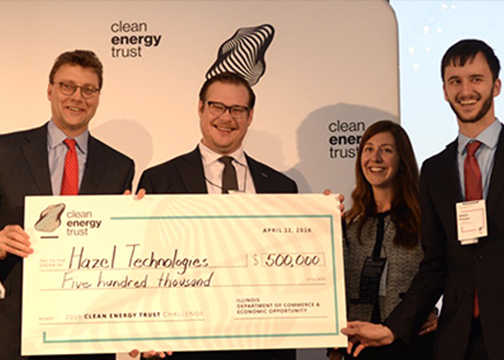Northwestern spinout company Hazel Technologies took home the top prize of $500,000 at the sixth annual Clean Energy Trust Challenge Tuesday.
Drawing a crowd of venture capitalists, civic leaders, and industry executives, the Challenge aims to support clean tech innovation in the Midwest by combining access to capital with access to premier mentorship and national exposure.
“Clean tech innovation, particularly deep tech innovation tied to fields such as materials science and chemistry, takes time and is extremely expensive,” said Erik Birkerts, CEO of the Clean Energy Trust. "We need to do more to take clean energy to market.”
Since 2011, the CET Challenge has awarded $3.2 million in funding to 29 teams, which has returned $86 million and created 300 new jobs.
Hazel Technologies, whose FruitBrite™ technology extends the shelf life of produce, flowers, and plants by up to 400 percent took home the Illinois Clean Energy Fund award, amounting to half of the $1 million of funding handed out to teams at this year’s Challenge.
“At this level of the competition, you’re competing with the highest caliber of companies in this stage of clean tech innovation," said Aidan Mouat, CEO of Hazel Technologies.
The team will use the funding for optimization of the technology and full commercialization of the product.
They were joined in the student track at the competition by Northwestern team, INjoo Networks, whose energy management software leverages the data of various networks in a building to solve occupancy problems and more efficiently heat and cool rooms.
Both companies competing in this year’s Challenge spun out of Northwestern’s 2015 NUvention: Energy class, a clean tech commercialization course co-sponsored by the Farley Center for Entrepreneurship and Innovation and the Institute for Sustainability and Energy at Northwestern (ISEN).
“The NUvention approach is both highly experiential and multidisciplinary, and combined with a deep dive into the field guided by experts, it has generated some highly successful teams,” said Mark Werwath, co- director of the Farley Center and lead instructor for the course.
This year’s Northwestern teams join a long line of CET Challenge winners from Northwestern, including last year’s winners AMPY, the makers of a device that uses the kinetic energy from motion to power smartphones and other electronic devices; NuMat Technologies, a materials company focused on gas storage; and ReCaF, an alternative fuels company.
In addition to supplying applicants to the Challenge, the University has proudly supported the competition since its inception.
“Northwestern is pleased to be a sponsor of the Clean Energy Trust Challenge again this year. Our support is a testament to the strength and importance of our association,” said Meg McDonald, assistant vice president for research at Northwestern.
For a description of all 14 teams who competed in this year’s Challenge, click here.




